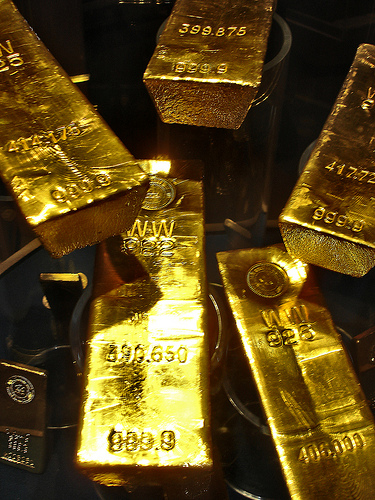
Investors have been buying up gold at an incredibly fast rate since the markets opened for trading this year and the increased demand has fired gold up for its best start since 1974. Analysts observe that long unlevered gold ETFs has enjoyed inflows of about $7.3B since the markets opened this year. More so, the most popular gold ETF (SPDR GLD) has seen inflows of $5.5B this year – the highest inflow recorded since 2009 during the global financial meltdown.
The uptrend in gold demand is not limited to the United States alone because the demand for gold is rising globally. In February, World Gold Council revealed that demand for the gold in the fourth quarter increased by 4% year-over-year to a two and half year-high of 1,117.7 tons. Central banks increased their holdings by more than 33 tons and investors bought an additional 25 tons in the quarter.
As I have mentioned earlier, the increase in gold demand has started to cause the price of the yellow metal to rise. In the year-to-date, gold has blessed investors with more than 16% price gains. More so, gold is the best-performing asset in the market now as it outperforms stock, bonds, and other precious metals. Interestingly, one startup made it very easy to buy gold and investors no longer have to break the bank before they can buy and store gold safely.
Why is everyone buying gold?
The gold-buying frenzy that is being recorded this year can be traced to the fears of uncertainties that has gripped the global economic scene. Gold tends to rise during periods of economic uncertainty because it is a great store of value.
The United States economy is having a back and forth between economic growth and economic decline – we all know that when the U.S. economy sneezes, the rest of the world tends to catch a cold. In addition, 2016 is an election year in the U.S. and possibility of a Sanders or Trump presidency is not reassuring for investors.
Britain is threatening to leave the EU in what is being referred to as the Brexit – Britain’s exit from the EU will weaken the Euro and exert downward pressure on the recovery in the Eurozone. Many firms have exposure to European markets and U.S. equities are not likely to be spared if the Eurozone faces an economic crunch.
Growth is slowing down in China and weakness in China weakens the prospects of economic growth in Asia – of course, when Asia is having problems, the manufacturing sectors tend to feel the heat. The manufacturing sector is important to the economic outlook and weakness in manufacturing will lead to a drop in employment numbers, an increase in the unemployment rate, and gloomier economic data.
Oil producing countries, non-OPEC members, and U.S. shale oil producers also playing chess with oil prices as a supply glut continues to exert downward pressure on oil prices. Saudi Arabia, Iran, and Russia are major players with markedly different interests and fixing the supply glut in oil appears to be the perfect battleground.
Should you join the bandwagon to buy gold?
Unless you are living in a world different from ours, you’ll need to find ways to protect yourself from an impending economic chaos. If you have deep pockets, you might not be worried about the current inflationary trends, but your deep pocket is actually the main reason you should be finding ways to protect your wealth. Gold has proven to be a great store of wealth in the last few hundreds of years and it will remain a valuable store of wealth for hundreds of years to come.
The first reason you should start buying up gold now is inherent liquidity that gold has over all other types of investment. You can take a gold bar now and travel down to practically anywhere else in the world and you won’t struggle to convert the gold into cash. Other assets classes (especially paper assets) such as stock, treasury bills, and bonds do not offer you that kind of liquidity because they might be worthless when taken to another country. In fact, the liquidity of cash is limited and you’ll lose more money to inflation if you keep your wealth as cash.
Secondly, gold is one of the few investments that doesn’t lose its value with the passage of time. Value is different from price – the value of gold is what it is worth while its price is the amount of money people are willing to pay for it. There’s a finite amount of gold in the earth’s crust; hence, its rareness contributes to its value. More so, it takes an amount of time, energy, and resources to do exploration, mine, and refine gold – the effort also costs some money. The value of gold tends to remain unchanged even though its price might fluctuate because of the dynamics of demand and supply.